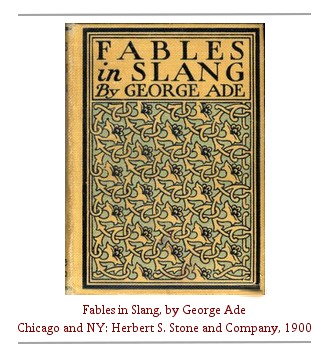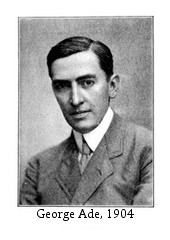Excerpt
The Fable of the Caddy Who Hurt His Head While Thinking
One Day a Caddy sat in the Long Grass near the Ninth Hole and wondered if he had a Soul. His Number was 27, and he almost had forgotten his Real Name.
As he sat and Meditated, two Players passed him. They were going the Long Round, and the Frenzy was upon them.

They followed the Gutta Percha Balls with the intent swiftness of trained Bird Dogs, and each talked feverishly of Brassy Lies, and getting past the Bunker, and Lofting to the Green, and Slicing into the Bramble–each telling his own Game to the Ambient Air, and ignoring what the other Fellow had to say.
As they did the St. Andrews Full Swing for eighty Yards apiece and they Followed Through with the usual Explanations of how it Happened, the Caddy looked at them and Reflected that they were much inferior to his Father.
His Father was too Serious a Man to get out in Mardi Gras Clothes and hammer a Ball from one Red Flag to another.
His Father worked in a Lumber Yard.
He was a Earnest Citizen, who seldom Smiled, and he knew all about the Silver Question and how J. Pierpont Morgan done up a Free People on the Bond Issue.
The Caddy wondered why it was that his Father, a really Great Man, had to shove Lumber all day and could seldom get one Dollar to rub against another, while these superficial Johnnies who played Golf all the Time had Money to Throw at the Birds. The more he Thought the more his Head ached.
MORAL: Don’t try to Account for Anything.
Comments
from Reader’s Delight, by Noel Perrin:
There was no way I could talk about George Ade without beginning by quoting him. He is irresistably quotable. And not just to casual reviewers, but to Serious Novelists. For example, when Theodore Dreiser was writing Sister Carrie, he wanted to describe the traveling salesman that Carrie meets on the way to Chicago in terms that would make instantly clear how deft the fellow was at picking up girls. It was the work of a moment to lift about a page from Ade’s “Fable of the Two Mandolin Players and the Willing Performer” and insert it in his text as if written by him. (He did remove most of the capital letters. Sister Carrie is written in normal orthography, and the passage would have been Extremely Conspicuous if he had not.)
 I don’t blame Dreiser for a second, and I understand why he was so hurt when he was accuseed of plagiarism. What he said in substance was that no one ever had described a fast operator so well, and no one ever would describe one so well, so it made every kind of sense to use these marvelous words, and he was simply paying George Ade the sincerest of compliments. Besides, they were both from Indiana….
I don’t blame Dreiser for a second, and I understand why he was so hurt when he was accuseed of plagiarism. What he said in substance was that no one ever had described a fast operator so well, and no one ever would describe one so well, so it made every kind of sense to use these marvelous words, and he was simply paying George Ade the sincerest of compliments. Besides, they were both from Indiana….
George Ade was a famous man from a few days after Fables in Slang was published until around 1920. Rich, too. He made so much money that he bought up most of his native county in Indiana to have for a hobby–and that was just one way of spending it.
Then he gradually dropped into obscurity–though as late as 1927, some of the fables were being syndicated as a comic strip. There are two reasons, I think. One is that success spoiled him. He published ten volumes of fables in all, and the second five aren’t nearly as good as the first five….
The other is that his vein is a very narrow one. The best hundred or so of his fables are nearly flawless–and they would be even without the capitals, just as e.e. cummings would still be a good poet with them. But in any other form of writing he was just a competent if remarkably prolific writer….
It is irresistable to quote George Ade. If there were more room, I would probably quote the entire fable of the Stuffer family, prosperous farm folk who move to town and attempt to continue eating in the heroic style to which they had been accustomed–and since it is one of Ade’s longest fables as well as one of his funniest, I would wind up seriously unbalancing this book. Instead I’ll merely urge you to find out what happened to the New York Person who had them trembling in Fostoria, Ohio. It’s not what a complacent eastener might suppose. There is a Turnabout of the most satisfying sort. Ade was good at that.
For More Information
- Wikipedia entry on George Ade
- Indiana Historical Society article on George Ade
- Article on George Ade and the environment from “Our Land, Our Literature,” an electronic exploration of Indiana’s environmental literature created by student scholars at the Virginia B. Ball Center for Creative Inquiry in Muncie, Indiana.
- Project Gutenberg free texts by George Ade: More Fables in Slang; People You Know; and The Slim Princess.

Oh, Ade’s fables are lovely. I find his later works disappointing; they often seem to me like generic magazine stories and musical comedies. But his earlier work is worth reading: “In Babel” collects his newspaper stories about Chicago, written in a plain careful style that has all of the precision of the fables. Look it up!
A critic (I forget who) wrote: “Someone is always rediscovering George Ade”